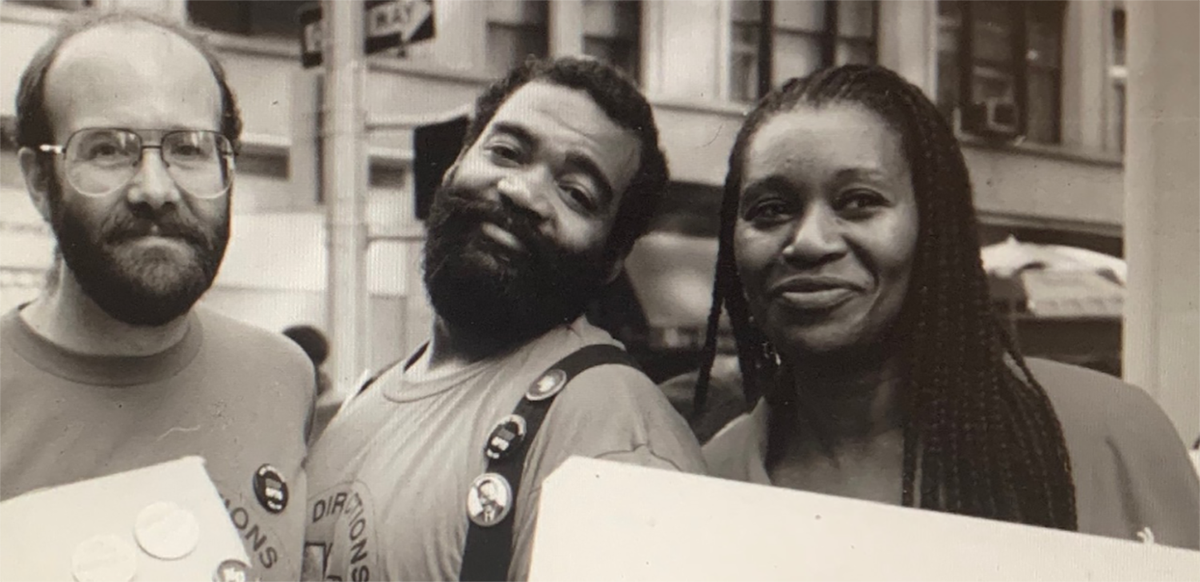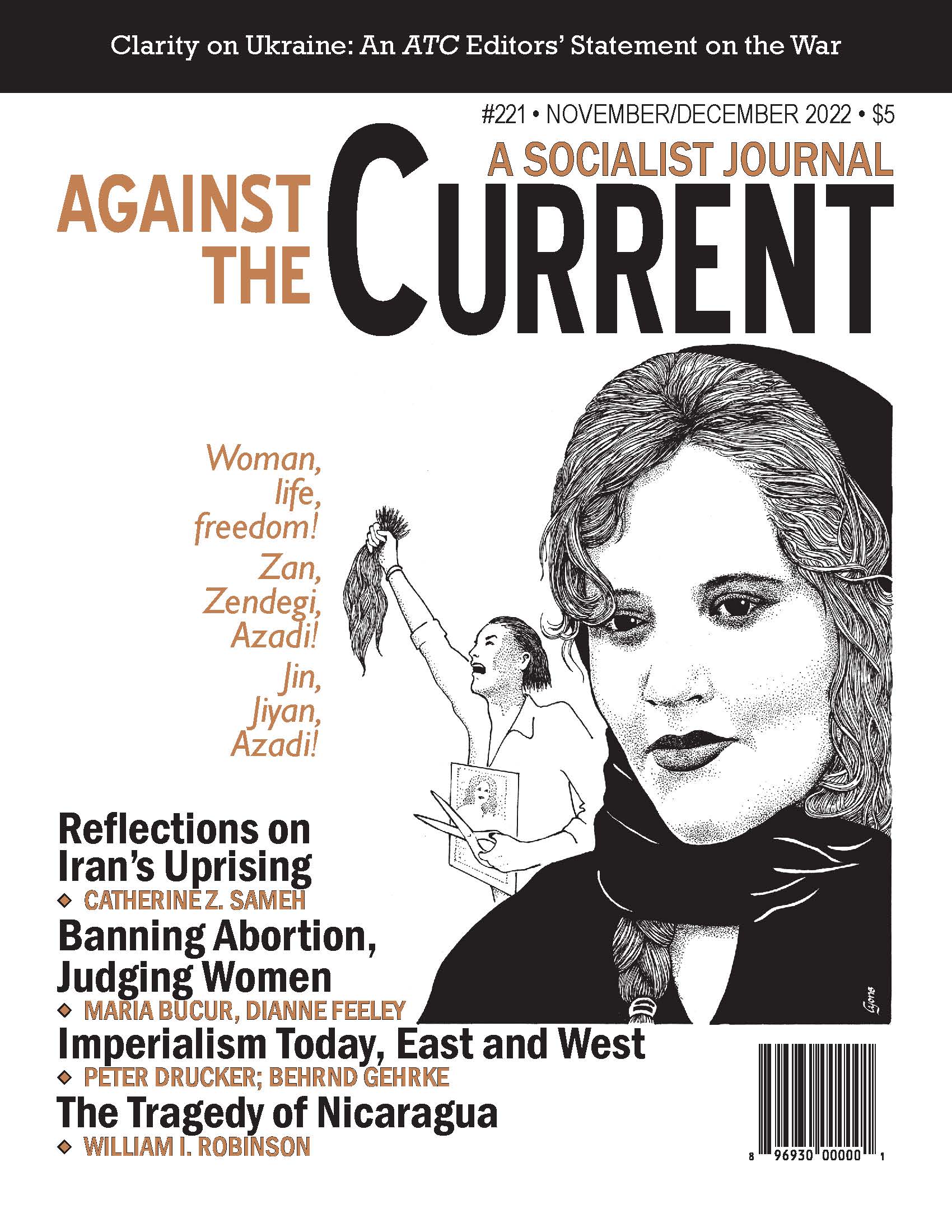Against the Current, No. 221, November/December 2022
-
Clarity on Ukraine
— The Editors -
Reflections on “In Her Name”: The Meaning of Iran’s Uprising
— Catherine Z. Sameh -
Solidarity with the Protest Movement in Iran!
— Fourth International -
Surveilling and Judging Women
— Dianne Feeley -
Indiana's Abortion Ban: Lessons from Dystopia
— Maria Bucur -
Update on Indiana Ban
— Maria Bucur -
Safe Reproductive Health Services in Indiana
— Maria Bucur -
UAW Members Vote at Last
— Dianne Feeley -
Are Railroad Workers at an Impasse?
— Guy Miller -
Detroit Police Kill -- Again
— Malik Miah - Climate Change Makes You Sick
- Global Crisis
-
China: The Henan Rural Banks' Scandal
— Au Loong-yu -
Chile: Analysis of a Defeat
— Oscar Mendoza -
Support Ukrainian Resistance
— European Leftists -
Puerto Rico: Hurricanes & Neoliberal Ravages
— César J. Ayala -
Nicaragua: Daniel Ortega & the Ghost of Louis Bonaparte
— William I. Robinson - Imperialism Today
-
Imperialism Transformed
— Peter Drucker -
About Russian Neo-Imperialism
— Bernd Gehrke - Reviews
-
Veterans in Politics and Labor
— Steve Early & Suzanne Gordon -
Romance, Revolution and a World on Fire
— David McNally - In Memoriam
-
Milton Fisk, 1932-2022
— Patrick Brantlinger and several ATC editors -
Remembering Tim Schermerhorn
— Marsha Niemeijer -
For Rank and File Power
— Steve Downs
Marsha Niemeijer

TIM SCHERMERHORN DIED September 11, 2022 at age 68. He was the son of a subway worker and in the words of one Daily News article, “entered the family business” where he became a powerful leader in the rank and file transit workers’ upsurge. Survivors include his wife Kay Schermerhorn, stepdaughter Alicia Archer, and grandson Jason Archer, age 4, who’s been described as “Tim’s heart” over these recent years. — The Editors
KAY ASKED ME to speak about Tim’s labor activism and class activism. Let me try to share some of his work with you — work that was so often done together with Kay, always together, side by side.
I have been so incredibly lucky to share a political path with Tim, as a fellow socialist comrade. I was in the same socialist organization as Tim and Kay. Tim and I were on the board of Labor Notes together for many years, and Tim wrote for Labor Notes and helped organize our conferences. We crossed paths in New York City from the moment I moved here in 2002. Tim and Kay became my teachers, as I am not from the United States and had much to learn.
And most importantly, Tim and I, and many of you here, agreed that the task of socialists in the labor movement is to be of the labor movement, as rank and filers and union activists, and to fight for, and with, the working class as a whole, on the job, but also in society outside of work. And Tim believed in the power of workers to reclaim better lives, where fights against the boss should spill into the streets and help shift the balance of power in our favor, against the billionaires and their political cronies.
When I started reflecting on his work, and talking to others who knew Tim, I realized how much he truly did. I knew Tim to be a force of nature, in how he smiled and laughed, his big heartedness and his storytelling, his sheer joy for righteous troublemaking, and his commitment to Black liberation — but to have done all that Tim did in his life, well, that takes someone so special that “force of nature” doesn’t even begin to describe it. It made me feel an even greater loss, the loss we all feel, knowing fully who Tim was and all that Tim did.
I know the transit workers here will say so much about Tim’s Local 100 contributions, so I’ll just share how that work inspired the rest of us. Tim’s favorite activity was organizing slowdowns and other rank and file actions in order to show management who really controls the MTA. His storytelling about those fights showed Tim’s passion for troublemaking with others. His eyes would be lit up, his laugh there, and you couldn’t help but want to take part in winning power too. It’s no surprise that Tim was the recipient of the 1st Troublemakers Award handed out by Labor Notes in 1997, for his devotion to the rank and file within Local 100.
Tim was committed to training and mentoring his coworkers to learn how to use that power, and how to be the best troublemakers around. He continued mentoring transit workers after 2014 when he was fighting the MTA to come back to work after an extended leave. He was involved in the stewards’ program, which he thought was the best thing going for the local. He said he was putting renegades in the field.
But his mentoring extended way beyond the local. During the 2012 Chicago Teachers strike, Tim was mentoring a younger member, Alicia Love, who was in the Black Rank and File Exchange, a national network which Tim helped lead and build. He reported that she was giving him strike reports that were as good as anyone in leadership could give.
He was ever mindful of the need to mentor young Black workers and community leaders such as those connected with Cooperation Jackson in Mississippi. Some of those activists and young leaders had been in labor. He reported, “They went in by themselves and with not enough training. I’ll stay close, helping them with their internal development and education, but also in terms of their outreach to local workers. In the southern African-American tradition with high respect for elders, I’m their movement elder.”
And he never stopped mentoring. He was mentoring an IATSE member in New York and just a few weeks before he died, he was looking to connect with a recently hired Black staffer at Labor Notes.
Never Slowing Down
Tim understood and wrote that “labor can make big steps forward when Black workers are in motion in their communities, because Black workers don’t protest in the streets while keeping quiet at work.” The nationwide summer of uprising in 2020 to protest the brutal murder of George Floyd made Tim hopeful there was a path — a challenging one — to bring that militancy and energy into the workplace.
After he left transit he gave classes on W. E. B. Dubois’ book Black Reconstruction at the Brecht Forum, mostly to young Black workers from all kinds of unions in New York. He was active in the Black Rank and File Exchange, which he helped found in 1984. The Exchange agreed that having Black leaders of unions is not enough if they aren’t responsive to the needs of the members. At their 1988 conference Tim said, “The real leaders are in the ranks, the ones organizing rebellions from the bottom up and empowering the Black rank and file.”
And he was planning against all odds to be at the June Labor Notes Conference. In one conference after another he took responsibility for pulling together Black Worker Network meetings. He maintained an extensive network throughout the country of Black workers and projects such as the Black Workers for Justice in North Carolina.
He was proud of sticking with this work for so long, through the ups and downs, and was excited to see Black workers playing such an important role in the current upsurge in labor militancy. He told LN, “when you keep at something, suddenly it becomes more of a project.”
Of course, we all know that illness was not going to slow Tim down. I spoke with his home dialysis nurse, Teresa, a few days ago, as she’s a member of the nurses’ union where my partner David and I both work.
She knew Tim well, and told me he had nine lives because he rallied back each time he got sick. Teresa and David recalled how Tim got involved, this time as a patient, in the contract fight against Fresenius, the dialysis provider where Teresa works.
Tim just could not stop organizing, wherever he was. Fresenius is notoriously horrific and profits dearly at the expense of so many who suffer from kidney failure, most of them people of color. When David was working on a Fresenius contract fight in 2017, Tim readily agreed to speak at rallies from the perspective of a patient. Teresa told me his presence made a difference, and meant a lot to the nurses.
Tim loved deriding the dictatorship of bankers, and spoke clearly about neoliberalism and austerity politics and the effects that social cuts had on everyone, but especially Black workers and workers of color.
He was building the labor movement we need, and don’t often have, to fight this capitalist system. When Ed Koch, former mayor of New York and the bankers’ cheerleader, died in 2013 Tim dared write an anti-obituary in Labor Notes. He said that labor could only have a lasting success in beating back austerity if it could go beyond single struggles — one firehouse, one hospital, one contract at a time.
Tim fought for all of us. I’m poorly paraphrasing W.E.B. Dubois, but Tim understood that it’s only when the white working class realizes that they too are harmed by the system of racist oppression that the end of capitalism will be in sight.
Tim leaves a tremendous legacy thanks to his life’s devotion to class politics. This final quote from Tim’s extensive writing and speaking, in Labor Notes and at our conferences, sums up well his legacy and vision. In April 2020 he wrote:
“Disasters, whether natural or man-made, are watershed periods of class struggle and are essential to class resistance. The employer class seizes the opportunity to take back hard-won gains from years of workers’ struggle.
“We are now faced with dual disasters, a global pandemic amidst a major economic downturn. This is a test of our militancy and our solidarity. If we have but a few islands of heroic fight back in workplaces and communities, while capital is organized as a class, we will lose. Solidarity and resistance are our alternatives and we have our best tools in our hands. Electoral change would come far too late in the coming offensive. If you have a small activist core and a modest project, now is the time to organize.”
As our friend Ricardo Levins-Morales wrote when we heard the news, “Hermano, you will be missed. But rest easy, man. We’ll take it from here.”
November-December 2022, ATC 221

